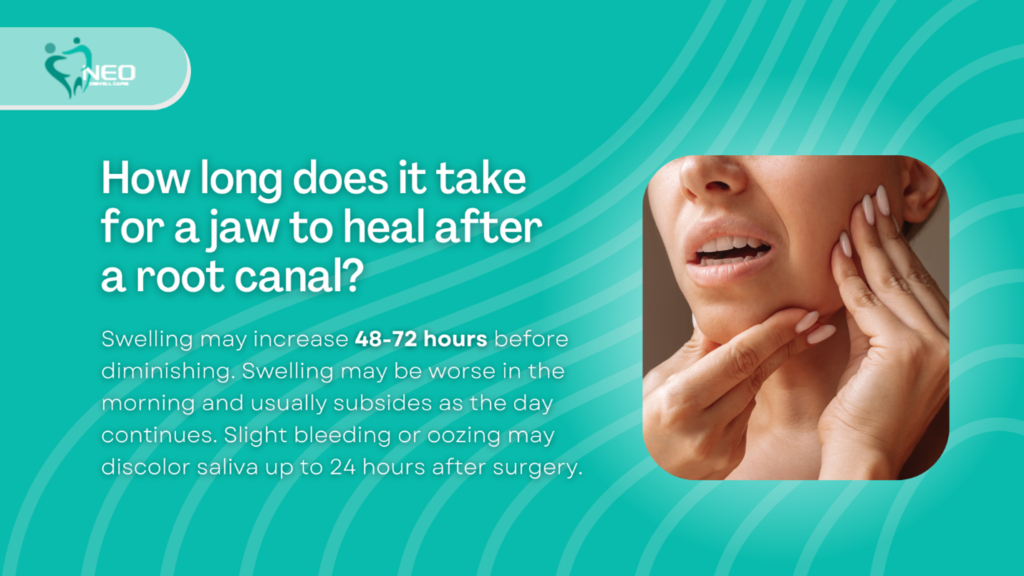Swelling in jaw after root canal can be a troubling symptom for many patients. This procedure is meant to save a damaged or infected tooth. It results in post-operative inflammation. Understanding the reasons behind jaw swelling can enhance patient comfort and recovery outcomes.
Neo Dental Care is a premier dental clinic in Noida. Under the guidance of Dr. Suhrab Singh, a seasoned expert with over a decade of experience, we provide exceptional dental treatments. This blog explores the typical causes of jaw swelling after a root canal. It offers professional insights and practical advice for managing this common issue. Our goal is to ease recovery and minimize discomfort for all patients.
Struggling with discomfort after a dental procedure? Consult with a dental expert today to ensure a smooth recovery.
Are you noticing unusual symptoms after your treatment? Here’s what you need to know.
Is Swelling in Jaw After Root Canal Normal?

While not every patient experiences jaw swelling after a root canal, it is fairly common. The swelling can arise due to the infection being treated or as a natural response to the minor trauma caused by the procedure itself.
Being an experienced dentist in Noida, Dr. Suhrab Singh explains, “Mild to moderate swelling is normal within the first few days post-treatment, as the body’s immune system works to heal the area.” He adds, “However, excessive swelling accompanied by severe pain or fever could indicate an infection or other complications requiring immediate attention.”
Advanced techniques and personalized care plans are employed to mitigate and manage symptoms post-procedure, including swelling. The proactive approach taken not only addresses immediate discomfort but also focuses on long-term oral health, ensuring that patients can return to their daily activities with minimal downtime.
Experiencing persistent pain or swelling? Book an appointment with a skilled dental professional for expert care.
Concerned about how long your recovery might take? Let’s dive deeper.
How Long Does It Take for Jaw to Heal After Root Canal?

The time it takes for the jaw to heal after a root canal can vary. But generally, most patients start feeling better within a few days. Complete healing often happens within two weeks. This timeline can depend on factors like the severity of the initial infection and the individual’s overall health. Patients must follow their dentist’s instructions, such as taking prescribed medications and maintaining oral hygiene, to support a smooth and speedy recovery.
During the healing period, you must monitor for signs indicating complications, such as persistent or increasing swelling, fever, or severe pain. If any of these symptoms occur, contacting an experienced dentist is advisable. By adhering to the care plan and attending follow-up appointments, patients can help ensure their recovery is as quick and effective as possible.
Still feeling the pain after your procedure? Schedule a consultation with an experienced dentist for personalized care.
Are you noticing other symptoms that seem off? Let’s explore what these symptoms could indicate.
Symptoms of Jaw Infection After Root Canal

Understanding the symptoms of a jaw infection is vital to preventing more serious complications after root treatment. Here are some warning signs to watch for:
- Persistent Swelling: Swelling that does not decrease after a few days or seems worse could be a sign of infection.
- Severe Pain: If the pain increases or doesn’t respond to over-the-counter pain relievers, it might indicate an infection.
- Fever: An elevated body temperature can be a sign that the body is fighting an infection.
- Foul Taste or Odor: A bad taste or persistent bad breath can suggest that an infection is present in the treated area.
- Discharge: Any oozing or pus from around the tooth or gum area should be addressed immediately as it indicates infection.
Worried about your symptoms after a root canal? Visit a trusted dental clinic for help—book your consultation today.
What can you do to alleviate discomfort and speed up healing? Here are some effective strategies.
How to Reduce Swelling in Jaw After Root Canal

Preventing a swollen jaw after root canal treatment involves several proactive steps. These include:
- Apply Cold Packs: Using ice packs on the affected area can help minimize swelling. Apply ice wrapped in a thin towel to the jaw for 15 minutes several times a day.
- Elevate Your Head: When lying down, keep your head elevated with pillows. This position helps reduce swelling by preventing excessive blood flow to the area.
- Take Prescribed Medications: Follow your dentist’s instructions and take any prescribed anti-inflammatory medications or pain relievers to help reduce swelling and discomfort.
- Limit Physical Activity: Reducing physical activity for a few days can help manage swelling and aid in the healing process.
- Stay Hydrated and Eat Soft Foods: Keeping hydrated helps reduce the risk of further infection, and eating soft foods can prevent aggravating the root canal jaw swelling.
Experiencing discomfort or swelling? Don’t wait—consult with a dental expert today to get the care you need.
What should prompt a call to your dentist? Let’s find out.
When Should You Contact a Dentist About Swelling in Jaw After Root Canal?
You should contact a dentist when your experience :
- Severe or Increasing Swelling: If the swelling in jaw after root canal gets worse instead of better over the first few days, or if it becomes severe, it’s important to consult your dentist.
- Uncontrollable Pain: Pain that continues to increase or is not alleviated by prescribed pain medication should be promptly addressed by a dental professional.
- Signs of Infection: Fever, pus, or an increase in discomfort are indicators of a possible infection.
- Difficulty Opening Your Mouth: If swelling is causing difficulty in opening your mouth, eating, or breathing, it’s crucial to seek immediate dental advice.
- No Improvement: If there’s no improvement or if symptoms persist for more than a few days without any signs of reduction, it’s advisable to get in touch with your dentist.
Let’s conclude. What have we learned about managing recovery after a root- canal?
Conclusion
In conclusion, understanding the typical healing process and recognizing signs of potential complications are essential after a root canal treatment. While some swelling and discomfort are normal and part of the body’s healing response, being aware of unusual symptoms such as severe pain, persistent swelling, or signs of infection is crucial.
Staying informed and vigilant helps ensure a successful recovery, allowing you to return to your daily activities with confidence and a healthier smile. If you’re experiencing any concerns following your procedure, remember that timely professional advice is your best path forward. Neo Dental Care is trusted by many individuals for their root canal treatment in Noida for their journey back to oral health.
FAQ’s
Why is there a lump under my jaw after root canal?
A lump under your jaw after a root canal could be due to inflammation or an infection at the treatment site.
What should I do if my jaw swelling doesn’t go down after a root canal?
If jaw swelling persists post-procedure, it’s crucial to consult your dentist as it may need further treatment.
How do you know if a root canal infection has spread?
Signs that a root canal infection has spread include increased swelling, severe pain, fever, and a general feeling of unwellness.
How do dentists fix a failed root canal?
If a root canal fails, a dentist may perform a retreatment, an apicoectomy, or in severe cases, extract the tooth to manage the issue.
Reference links:
https://my.clevelandclinic.org/health/treatments/21759-root-canal https://www.medicalnewstoday.com/articles/320978

